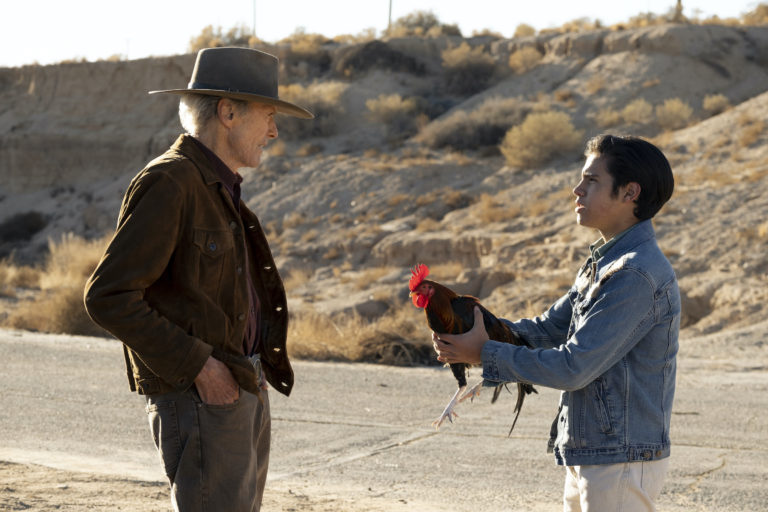Cry Macho (2021 | USA | 104 minutes | Clint Eastwood)
A meandering film that never really figures out what it wants to be, Cry Macho takes its sweet time in leading the audience along on a road trip to nowhere. It follows Clint Eastwood as Mike Milo, an aging man who is down on his luck and is tasked with abducting a boy from Mexico to bring him to his father in Texas.
Complications ensue when they meet in Mexico as Milo encounters resistance from the kid’s mother before eventually building a bond with the boy, Eduardo Minett’s Rafo, and escaping together. Rafo and Milo then must navigate through a series of backroads and off the grid towns to make it back to Texas. They’ll learn about themselves, following a standard and generally generic plot without much to say. When the biggest point of praise is the acting and comedic timing of a rooster, your film might be in trouble. The rooster was originally supposed to be in a cockfight, but ends up becoming the actual origin of the film’s title. ‘Macho’ is the animal sidekick that accompanies and even saves the characters at points along on their journey.
The film tries to ignore the full gravity of the reasoning behind the journey, and seriousness of what is being undertaken. Instead of considering the complexities of immigration in its time period of the 1970s, the tone is mostly kept light with the most focus on light ribbing about the differences the characters have in age and race. This is to the detriment of the film as the humor all feels far too easy and increasingly repetitive, as though Eastwood the filmmaker isn’t really all that interested in any of the events that are playing out.
It makes you feel that, if the film isn’t interested in itself, why should we be? There is so little to grasp onto that it really is hard to stick with the journey itself. The film seems like it is going for a more reflective piece on Eastwood’s career. This is something I am all for, when done well. I was particularly won over by David Lowery’s 2018 film The Old Man & the Gun that was a sendoff to Robert Redford. That shows that this type of piece can be done, though Cry Macho is just not able to pull it off. Such reflective films have been better handled by a director whose distance from the material ensures he can handle it with a more deft touch.
The kindest thing that can be said about the film is that it has less absurd decisions than the last film Eastwood starred in and directed, 2018’s woefully misguided The Mule.
Perhaps the biggest problem is that Cry Macho creates manufactured drama when it feels the story is starting to stall. These conflicts never feel authentic as it is pretty clear that, somehow, Milo will find his way out of the situation. Even if the film was a tensionless viewing experience, that could all be forgivable if the narrative expressed more commitment to developing the characters. The side characters are mostly set dressing and the central dynamic never goes much deeper. There could be a story here, this film just never delves into what it has to offer.
The most interesting scenes that come midway through still offer some heart. The duo ends up stopping at a cantina that is still on the southern side of the border. When this becomes the film’s primary setting, it misses some clear opportunities for more emotional depth. A sweet scene around a dinner table where Eastwood’s gruff exterior begins to crack shows a hint of what could have been, though it never goes further. The woman he begins to form a connection with at the bar, Natalia Traven’s Marta, does a lot with very little though never feels like a complete character. She merely feels like a reason Milo can have to take a new direction in his life when the story needs him to. Traven imbues these moments with a lot of heart, though it’s not enough to come across as anything other than regrettably empty.
The film’s biggest obstacle is Eastwood himself who just feels utterly miscast in the role. He seems to be replicating his gruff performances from past films without bringing the emotional range and sensitivity of a lifetime’s experiences that would benefit this sort of character. The whole arc of the movie is about coming to terms with your past in order to change the future, though Eastwood is largely one note in being a fantasy western tough guy. Perhaps this level of caricature is intentional, meant to serve as a meta-commentary of some kind on Eastwood’s persona over his career. However, when he is getting into fist fights with a random pursuer and leading corrupt police a car chase at age 91, it feels more like it is buying into his own fantasy. Even a late monologue Eastwood givesabout what it means to be “macho,” with all the subtlety of a freight train, can’t redeem it.
What is fascinating is that Eastwood wasn’t always cast in the role. It was originally meant to be Arnold Schwarzenegger, which if not a better choice might still have been more interesting because of the parallels the film would have had to that actor’s life. Instead, Eastwood’s performance just can’t hit the high notes the film needed. The themes can still be heard ever so faintly, though they are completely lacking in any power. This gives the film an approximation of emotional resonance, though its only an imitation of its full potential . By the time the narrative creeps around to its conclusion, it all ends abruptly with an empty and soulless thud.
Cry Macho (header image credit Claire Folger, courtesy Warner Bros. Entertainment) is in theaters and on HBO Max September 17.



